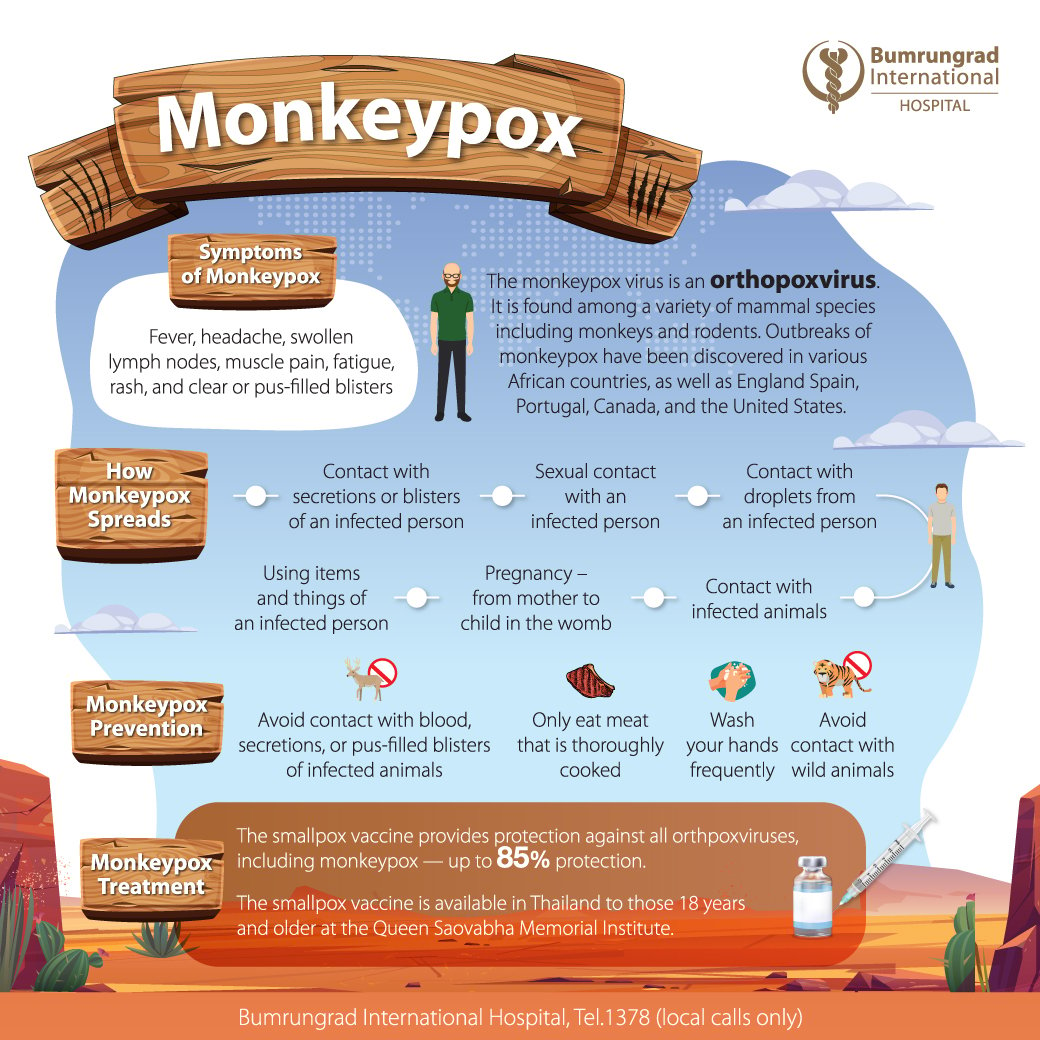
What is monkeypox?
Mpox or Monkeypox is caused by the Monkeypox virus, a species of the genus Orthopoxvirus in the Poxviridae family. It is part of the same family as the virus that causes smallpox but less severe. While earlier, most mpox infections were transmitted to humans through infected animals, currently, human-to-human transmission of monkeypox virus has also been found. Commonly found in Central and West Africa near tropical rainforests, it has been spreading to more urban areas in recent times.
How can monkeypox be transmitted?
- Animal-to-human transmission: With monkeys and rodents such as rats and squirrels being the mpox virus carriers, the virus is transmitted through contact with the blood, secretions, pustules or open wounds of infected animals, as well as the intake of undercooked meat.
- Human-to-human transmission: The virus is transmitted through contact with the infected persons’ secretions and lesions, or disinfected contaminated materials they’ve used. Transmission is also possible through exposure to respiratory droplets when in close contact with an infected person for a long time.
What are the symptoms of the mpox infection?
After being infected, patients will start to show symptoms within 5-21 days, during the two periods of infection:
- First period (days 0-5) symptoms include fever, headache, sore throat, swollen lymph nodes, back pain, muscle pain and weakness. Patients can spread the virus from the time they have a fever. A small amount of infection may occur during this period.
- Rash period (1-3 days after fever) features the rash usually more concentrated on the face and extremities than the body, especially the face (95%) and the palms and soles (75%). Also affected are the oral mucous membranes (70%), the genitals (30%), the conjunctiva (20%) and the cornea. The rash starts as flat, red bumps, which turn into blisters, then pustules, before crusting over and falling off finally. How severe it is for a patient depends on the quantity of virus the person has been exposed to. Infection can spread easily during this period until the crust falls off, lasting about 2-4 weeks.
How is monkeypox treated?
Currently, there is no specific treatment for monkeypox. Treatment provided aims to relieve symptoms and control the risk of complications. In 2022, the European Medical Association (EMA) approved the use of the antiviral drug tecovirimat, previously approved for the treatment of smallpox, for monkeypox, but this drug is not yet widely available.
Monkeypox prevention
It is recommended that one maintain good hygiene, wash hands frequently, avoid sharing personal items with others, avoid contact with those infected or those at risk, avoid contact with animals that could be carriers of the disease, and avoid consuming undercooked meat. If traveling to a risk area, monitor your symptoms while in the risk area and for another 21 days after leaving the risk area. Those who have been in close contact with someone with monkeypox, the Centers for Disease Control and Prevention recommends vaccination within 4 days after exposure to prevent infection and vaccination within 14 days to lessen the severity of the disease.
Monkeypox vaccine
There is currently no particular vaccine to prevent monkeypox. However, a two-dose subcutaneous vaccination, spaced at least 28 days apart, shows an efficacy rate of 80 to 85% in preventing mpox. The vaccine will be effective in preventing the disease within 14 days after the second dose. In Thailand, the vaccine is available at the Queen Saovabha Memorial Institute, Thai Red Cross Society.
Those recommended to get vaccinated are the following groups of individuals aged 18+ at high risk for mpox:
- Those who have been exposed to the disease, including those who have direct contact with infected people, having had sex with or being in close contact or exposed to their lesions, should get vaccinated within 14 days after exposure (ideally within 4 days).
- Mpox vaccine pre-exposure prophylaxis is recommended for healthcare workers dealing with mpox, HIV-positive individuals, and gender-diverse people especially high-risk men having sex with men, with multiple sexual partners, or diagnosed with sexually transmitted infections within the past six months.
Information as of August 20, 2024
For more information please contact:
Last modify: May 15, 2025